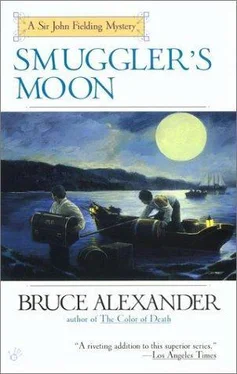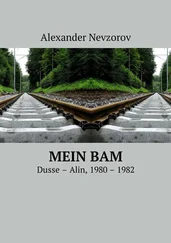Bruce Alexander - Smuggler's Moon
Здесь есть возможность читать онлайн «Bruce Alexander - Smuggler's Moon» весь текст электронной книги совершенно бесплатно (целиком полную версию без сокращений). В некоторых случаях можно слушать аудио, скачать через торрент в формате fb2 и присутствует краткое содержание. Жанр: Исторический детектив, на английском языке. Описание произведения, (предисловие) а так же отзывы посетителей доступны на портале библиотеки ЛибКат.
- Название:Smuggler's Moon
- Автор:
- Жанр:
- Год:неизвестен
- ISBN:нет данных
- Рейтинг книги:4 / 5. Голосов: 1
-
Избранное:Добавить в избранное
- Отзывы:
-
Ваша оценка:
- 80
- 1
- 2
- 3
- 4
- 5
Smuggler's Moon: краткое содержание, описание и аннотация
Предлагаем к чтению аннотацию, описание, краткое содержание или предисловие (зависит от того, что написал сам автор книги «Smuggler's Moon»). Если вы не нашли необходимую информацию о книге — напишите в комментариях, мы постараемся отыскать её.
Smuggler's Moon — читать онлайн бесплатно полную книгу (весь текст) целиком
Ниже представлен текст книги, разбитый по страницам. Система сохранения места последней прочитанной страницы, позволяет с удобством читать онлайн бесплатно книгу «Smuggler's Moon», без необходимости каждый раз заново искать на чём Вы остановились. Поставьте закладку, и сможете в любой момент перейти на страницу, на которой закончили чтение.
Интервал:
Закладка:
He rolled over upon his side and fished out of his waistcoat pocket a fat watch of German make. It opened with a button spring. He held it up and looked at it closely by the light of the moon.
“I misjudged by ten minutes,” said he. ”I have it here as twenty minutes to one in the ay-em. Keeps good time. Should be right.”
I nodded, shifted my position, and waited longer. The moon was nearly full and very bright. In the gap between my valise and one of the sandbags, I looked down the road upon which the wagons were expected to come and was surprised at the clear detail I saw in the scene before me. Each bush, rock, and tree stood out as if in the clear light of day. In a sense, there was not much to see, for the road curved out of sight only about ten rods, or perhaps a little less, from where we were positioned.
“You’ll hear them before you see them,” said Patley.
“What will they-”
”Shhh! Listen! Here they come.”
I attended closely but heard nothing-nothing, that is, of hoofbeats and creaking wheels; I caught only the sounds of the night-the breeze rustling the leaves of the trees, the call of an owl. Were Mr. Patley’s ears so much sharper than mine?
Evidently they were, for in about a minute’s time there came the sound of voices. I had not expected that. Perhaps I had thought the smugglers would be as silent as we. They were not. There was shouting and raucous laughter coming from beyond the bend in the road. I suspected that they had got at the brandy they were hauling and drunk deep of it. They must have contemplated the journey to London as one long drunken ramble.
Thus did they come. Just as the first wagon appeared, one who rode in it burst into song, and two or three of the celebrants joined him. I did not know the ditty, nor could I quite make out the words to it, but it had the sound of a sea shanty, or some sort of drinking song.
It was remarkable to me how close they came to us before noticing that there was something amiss. The fourth and last of the wagons had just appeared at the bend when the first of them at last pulled up no more than ten yards distant from us. It was close enough, in any case, so that I could tell that indeed there was something out of the ordinary about this wagon and team which led the smugglers’ caravan. It was filled not with goods but with men-armed men, whose assigned task it was to protect the three wagons behind them. This they might have done well enough had they been sober, for indeed they outnumbered us four and were heavily armed. Nevertheless, their condition had the effect of making our respective circumstances even. And after all, we would soon have the cavalry galloping to our aid, would we not?
The first wagon had come to a halt so close to our team-less hackney that we could hear its occupants discuss this peculiar situation as they might a felled tree in their path or a flooded river.
“Here, now,” said the driver, who seemed the most sober of all, ”what’s this large thing blockin’ our way? Looks like a coach, so it does.”
“Where?”
“Let’s see.”
“Right up yonder it is.”
“I be damned if you an’t right. It does look like a coach for fair, don’t it?”
By then, all in the wagon were up from the wagon bed and looking at the hackney. One or two had bottles in hand, others pistols; some simply stood empty-handed and stared. There was general agreement among them that what stood before them, blocking their way, was a coach.
“But where’s the team of horses that brought it there? How did it get there?”
“And why did they leave it-that’s what I’d like to know.”
“Well, I’d like to know, too,” said the driver in a manner which seemed to be intended to put an end to such useless commentary. ”But one thing I’m certain about. A couple of you-or maybe it’ll take four-better climb down and move that thing because I can’t get around it on either side. Trees are too thick and close to the road. Just push it over into the ditch, which is where it ought to be anyways.”
The six or eight in the wagon set to arguing amongst themselves as to which of them were to push our hackney off the road. Having worked it out at last amongst themselves, the designated four clambered down from the wagon. Just at that moment a voice sounded forth deep and loud from among the trees; we recognized it in an instant as Sir John’s.
“I am Sir John Fielding. I hold an appointment as magistrate of Deal. I order you to lay down your arms and climb down from your wagons with your hands raised, for you are all under arrest by my order. If you resist, or attempt to flee, you will be shot dead. This is your one and final order.”
The driver of the wagon jumped down immediately and threw his hands up into the air. The four, who were at that moment the most exposed, looked wildly about. The others stood rooted in the wagon.
“Who was it? The magistrate? I thought he was kilt.”
“Where’d that voice come from?”
“That copse of trees behind the coach.”
Having heard that, one of the four drew his pistol from his belt and fired blindly at the trees. Mr. Patley returned fire, and the shooter fell dead. Then did all seem to happen quite simultaneous.
Patley passed the musket he had just discharged to me and took up the other. I set about to load the empty gun. Those in the wagon began firing up at us with their pistols; all shots flew overhead, save one which hit the valise with a thunk. Patley fired again and another dropped. I passed him the weapon I had just loaded.
But then-most alarming-we heard scrambling below and realized that three of the original four were below attempting to scale the coach with the intention of murdering us. I grabbed my pistols whence I had stored them, rolled over to the edge of the coach roof, and came face to face with an ugly owler; his pistol was half up, yet before he could discharge it, I brought mine down upon his crown, barrel-first, knocking him senseless. His eyes rolled in his head; he fell to the ground, knocking another down beneath him. I fired down at the sprawl, unsure which I had hit, nor whether I had hit either. Then, with my second pistol in hand, I looked about for the remaining villain. I found him behind me at the far side of the coach roof with his knee up and a pistol in his hand. Taking care to aim, I fired my own at him, and he fell back out of sight; I heard a thump as he hit the ground.
Then was all suddenly, deafeningly silent. Only the restive horses stomped and whinnied.
I saw Mr. Patley rise slowly to his knees from behind our makeshift rampart, his musket at the ready. I followed him up and set about purposefully loading my pistols. Before me and below, there were four men with their hands upraised. In the open wagon I could see one stretched horizontal across the floor-dead or badly wounded-and another close by, certainly dead. I could not be certain about the three at the foot of the hackney; whether they were alive or dead I knew not but would soon discover.
Then did Sir John’s voice boom out once again: ”Gentlemen, please make your reports. Mr. Perkins?”
“Two prisoners, sir.”
“Mr. Bailey?”
“Two prisoners.”
“Mr. Patley?”
“Four prisoners and two dead. Three are not yet accounted for.”
“Jeremy? Are you all right?”
Before I could open my mouth to give assurances, Mr. Patley sang forth: ”Jeremy’s better than all right, Sir John. The lad’s a proper soldier.”
“All good news then?”
“Not quite,” Mr. Perkins called out. ”There were four wagons. The last of them got turned round and took off down the road they came up.”
“We’ll leave them to the Carabineers,” said Sir John. ”They’ve contributed naught so far to this operation, save for their presumed presence down the hill. And if we find that cocky young lieutenant has let that wagon get through and escape, I shall twist his ear for him.”
Читать дальшеИнтервал:
Закладка:
Похожие книги на «Smuggler's Moon»
Представляем Вашему вниманию похожие книги на «Smuggler's Moon» списком для выбора. Мы отобрали схожую по названию и смыслу литературу в надежде предоставить читателям больше вариантов отыскать новые, интересные, ещё непрочитанные произведения.
Обсуждение, отзывы о книге «Smuggler's Moon» и просто собственные мнения читателей. Оставьте ваши комментарии, напишите, что Вы думаете о произведении, его смысле или главных героях. Укажите что конкретно понравилось, а что нет, и почему Вы так считаете.












